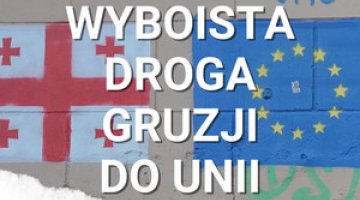Drifting towards Russia: an acute political crisis in Georgia
On 15 April, the Georgian parliament resumed proceedings on the controversial law entitled ‘On the transparency of foreign influence’ (the so-called law on ‘foreign agents’ which is modelled on Russian law, and targets independent media and NGOs: see ‘Georgia: the foreign agent law, v2.0. A toughening stance ahead of elections?’). The resumption of work on this law has sparked mass street protests, while the opposition, the EU and the US have all voiced their objections. The crisis has been exacerbated by statements from the ruling Georgian Dream (GD) party that have essentially questioned Georgia’s pro-Western course, and by harsh criticism of the GD from the opposition and Western officials. At the same time, the GD has passed amendments to the tax code which are intended to facilitate financial transfers from Russia.
The government has deliberately played the crisis to its advantage, using it to whip up tension in society, polarise and discredit its political opponents, and ultimately boost its chances for a landslide victory in the parliamentary elections in October. The protests are highly likely to escalate in the short term. In the current situation, Georgia’s political dialogue with the West may be frozen or even broken off, and the country may move forward with its reorientation towards Russia.
The law on foreign agents
The law, which was adopted in its first reading on 17 April, requires NGOs and media outlets that receive at least 20% of their funding from abroad to register as ‘agents pursuing foreign interests’. In practice, this will target Western-funded entities that promote pro-European and democratic ideas and are critical of or opposed to the GD, which has been in power since 2012. An almost identical piece of legislation that was under consideration in March 2023 triggered mass protests and criticism from the West, as a result of which work on it was suspended.
This means that the government’s decision to resume work on this law now is a calculated move aimed at provoking confrontation. If passed, it would represent a political defeat for civil society, the opposition and the West; it would undermine the fractured opposition’s authority and solidify the GD’s current advantage on the political scene and in the information sphere. The party appears willing to take the risk of sparking violent protests in order to heighten fears about the country’s stability, and to lay the blame on its political opponents for plunging the country into anarchy.
In addition to pursuing the short-term political interest of consolidating the party’s hegemony in Georgia, the GD’s recent moves have been consistent with its drift towards Russia which has been seen over the past two to three years, while the tensions in its relations with the EU and the US have increased. Western officials have for years voiced their criticism of the GD’s steps to undermine the country’s democratic foundations, including the imprisonment and alleged use of torture against former President Mikheil Saakashvili, the continued marginalisation of the opposition (and the party’s violation of the arrangements that were adopted as a result of the EU’s mediation) and restrictions on the freedom of the media and NGOs.
Criticism from the West, including the EU, stems from Georgia’s stated pro-Western orientation, the continuing dominance of those who support the country’s integration with the EU (around 80% of the population) and Georgia’s obligations arising from the integration process (despite doubts, the EU granted it candidate status in December 2023). The GD sees this criticism as a direct threat, along with issues such as the freezing of the European assets of its de facto leader Bidzina Ivanishvili.
At the same time, Russia’s importance in Georgian politics has been growing. The GD has tapped into the Georgian people’s fear of conflict with it and has fuelled strongly conservative sentiments, which are opposed to the EU’s ideologically liberal policy and attached to the Orthodox religion. It has also emphasised the economic benefits of cooperation with Russia (which are especially significant in the face of Western sanctions) and China (the two countries signed an agreement on strategic partnership in July 2023). At a minimum this policy has strengthened the GD politically and socially, while its maximum variant reflects the party’s deliberate strategic turn towards Russia. On 20 April, the GD’s head Irakli Garibashvili made remarks that can be interpreted in this vein: he said that Georgia is not ready for membership in the EU, that the West is responsible for destabilising the country, and that Georgia’s key problems are related to global instability and the need to restore the country’s territorial integrity, which implicitly increases Russia’s role.
To be or not to be for Georgia’s pro-Western orientation
The Georgian political scene’s fundamental problem is the weakness and fragmentation of the opposition, which stems from the political ambitions of its leaders (including the role of the imprisoned Saakashvili), its insufficient financial and media resources, and finally its lack of a strategy for mobilising society.
On the one hand, the Georgian public is unequivocally pro-Western: popular protests have determined the country’s orientation to date. On the other hand, however, it does not trust any political forces, while displaying a conservative attitude underpinned by the authority of the Orthodox Church and a fear of conflict with Russia. This situation favours the ruling party. The country’s most powerful politician at present who has been consistently critical of the GD, President Salome Zourabichvili – who was elected thanks to GD votes – has openly criticised the government both in the EU and domestically, but has neither the prerogatives or the political backing to pose a threat to the ruling party. Moreover she has not displayed any such ambitions; for example, she has refused to pardon Saakashvili.
For the past few days, protests involving thousands of Georgians have been taking place in Tbilisi; the demonstrators are primarily young people and students organised in the Dafioni movement. The opposition has also participated in the demonstrations, pushing the protesters to work towards greater coordination (on 18 April six opposition parties pledged to cooperate). The protests have been essentially peaceful, although several police officers have reportedly been injured, and the government has used repression only sporadically so far, detaining several dozen people.
The future of these demonstrations will depend both on whether the current mobilisation of society can be sustained (the government seems to be betting that fatigue will set in among the protesters) and whether the government’s actions will lead to a planned or accidental escalation of the demonstrations. If the protests die down, there will be few options for engaging in other forms of resistance, while the effective consolidation of pro-Western groups will remain a challenge.
Prospects
The government has shown great determination in pushing ahead with the controversial law and, more broadly, in revising Georgia’s political orientation. The optimal solution for the GD is to stretch out the legislative process in an effort to tire out the protesters (two consecutive readings and the president’s signature are required for the law to pass; in the event of the expected veto, it will also be necessary to hold a vote to override it). It is also possible that the demonstrations will escalate and the government will move to suppress them while trying to exploit the Georgian people’s fears that the country could be destabilised.
In the current situation, Georgia’s further drift, and perhaps even its outright reorientation towards Russia, seem inevitable. Today it is Russia, rather than the EU, that has the advantages which are attractive to the GM and offer opportunities for strengthening the party’s position at home, weakening the opposition and gaining financial benefits from economic cooperation. Russia could possibly exert pressure on Georgia by exploiting the fear of war and using the unresolved conflicts in Abkhazia and South Ossetia, for example by raising hopes that the two regions will draw closer to Tbilisi. Should the crisis in Georgia escalate, Russia could become actively involved; Russian politicians have repeatedly expressed their support for the Georgian government and its ‘independent’ – that is, anti-Western – policies.
The current situation poses a very serious challenge to the West’s position in Georgia. There is a serious risk that two decades of pro-democratic and pro-Western reforms in the country could be undone. Western pressure on the Georgian government may be ineffective and its outreach to the government in Tbilisi may be limited; indeed, the EU’s decision to grant Georgia candidate status was already a form of political credit.





